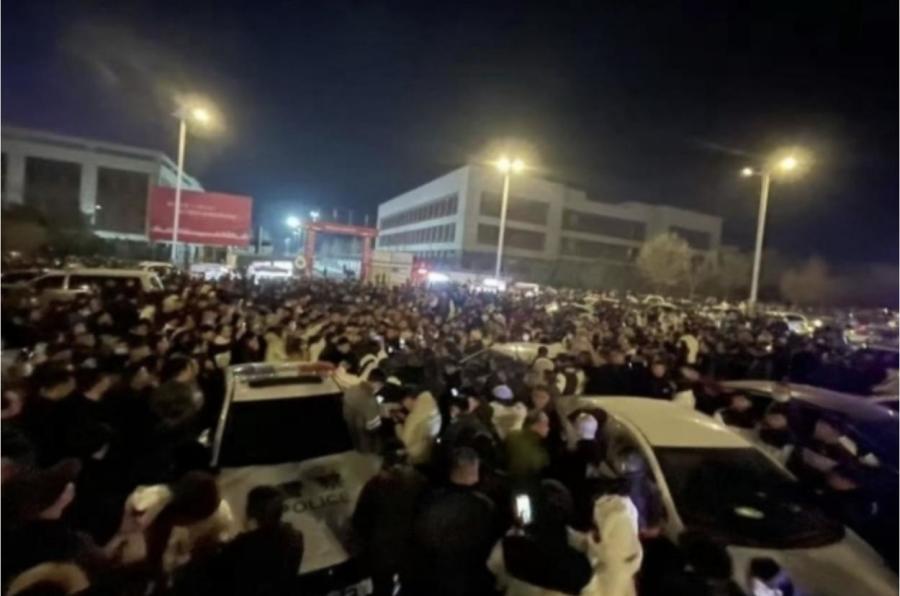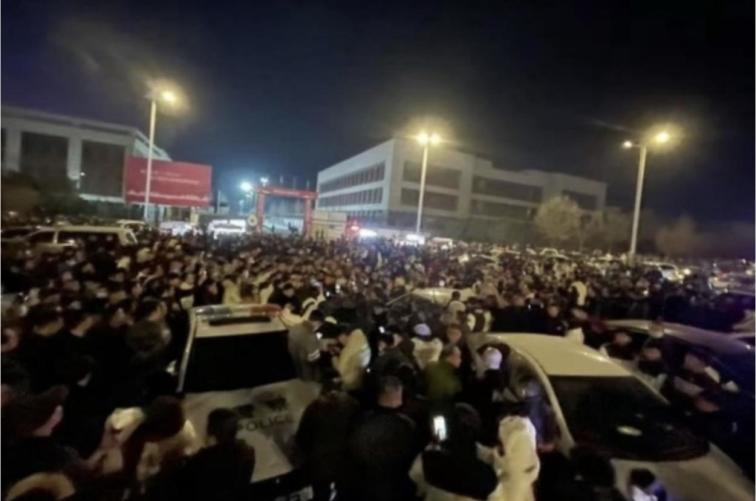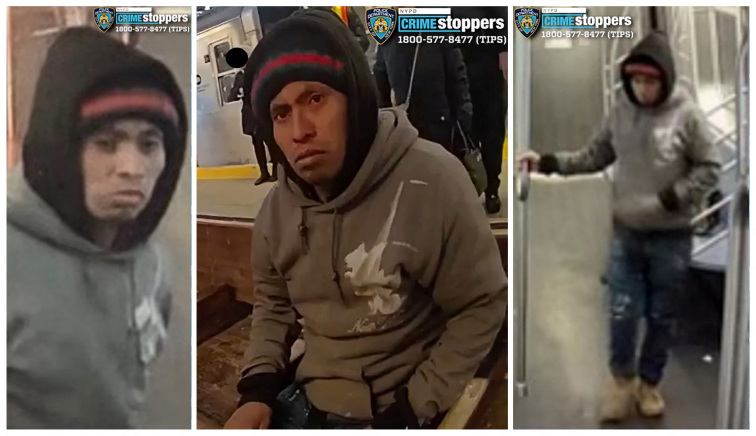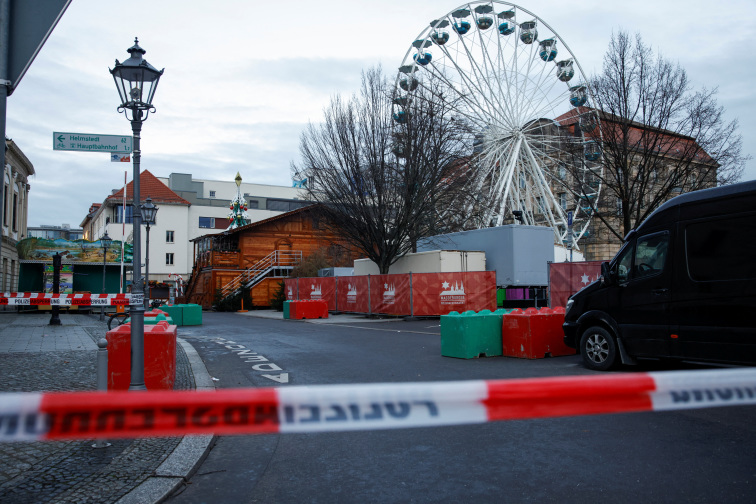On January 2, 2025, a senior student at the Pucheng County Vocational Education Center in Weinan, Shaanxi Province, died in a mysterious fall from a building. Reports circulated online that the student had been bullied, sparking public outrage. On January 5 and 6, tens of thousands of people gathered outside the school demanding answers, leading to clashes as police cracked down on the protests. (Video Screenshot)
People News - Following the student’s death, large-scale protests broke out after the family’s attempts to uncover the truth were thwarted. This escalated into violent confrontations between police and the public. Observers are concerned that as China’s economy continues to slump and public dissatisfaction grows, this heavy-handed stability maintenance model may lead to even stronger backlash.
According to a Voice of America report, videos circulating online showed massive crowds gathering at the Pucheng County Vocational Education Center in the wake of the incident. At its peak, thousands of people were present. The angry crowd demanded justice for the student, with some attempting to break through the cordon to enter the campus, resulting in clashes with police.
Lin Shengliang, founder of the China Human Rights Accountability Database, explained in an interview with Voice of America that the incident escalated into police-public conflict due to both chance and inevitability.
“By chance, the authorities and school did not anticipate that the public would distrust their account and be bold enough to stand up. Inevitably, this is the result of long-standing public dissatisfaction with society and deep mistrust of the government,” Lin said.
Suspicion of campus bullying
The victim, a 17-year-old student surnamed Dang from the Pucheng County Vocational Education Center, fell to his death from his dormitory in the early hours of January 2. According to social media accounts documenting mass incidents, the victim's mother was taken directly to the funeral home to see his body on the day of the incident. She reportedly found multiple bruises on his body. However, the school refused to let her inspect the scene or provide footage from surveillance cameras. The mother suspected foul play and believed her son had been bullied.
As the incident gained traction, local authorities strictly controlled information, confiscating photos and videos from the phones and smartwatches of students who witnessed the events.
Starting last weekend, the victim’s family began protesting outside the school. Local residents learned about the incident and gathered in solidarity outside the campus, protesting against the authorities’ information blockade. The situation escalated on January 5 when the victim’s uncle was detained by police. The protests only subsided temporarily on January 6 after local officials coordinated the involvement of out-of-town riot police. The term “Pucheng” has since become a sensitive keyword on Chinese internet platforms, making it difficult to find related information about the clashes and protests.
On January 5, a joint investigation team established by the Pucheng County government issued a statement. According to the statement, the student surnamed Dang had an argument and physical altercation with two classmates in the dormitory on the night of January 1 because he was upset about their conversation disturbing him. A staff member reportedly intervened to mediate and sent the students back to their dorms separately.
The investigation team stated that in the early hours of January 2, Dang’s roommates discovered a wooden stool placed under the dormitory balcony window, which was open, while Dang was found lying on the ground below, already deceased. Based on on-site investigations, the authorities ruled out the possibility of a criminal case and concluded that Dang had fallen to his death from a high place.
Family Potentially "Stabilized" by Authorities
A video circulating online, purportedly recorded by the mother of the student surnamed Dang, shows her emphasizing that officials have intervened to investigate the case while urging the public "not to believe rumors." When Voice of America called a phone number believed to belong to the student's mother, the person who answered refused to confirm her identity.
The respondent said: "I don't know you. I don’t understand what you’re talking about. Yes, we know about this, but I don’t know that person you mentioned. Who gave you this number? It’s the wrong one. I have no opinion. We’re farmers—what are we watching? Just seeing how the government handles it."
Dissident Lin Shengliang, currently in the Netherlands, suspects that the student’s family may have been subject to “stability maintenance” measures.
Lin explained: "According to usual practice, her phone could be under control, or monitored 24/7. Another possibility is that the person is under ‘soft detention.’ That means it won’t appear to outsiders as detention, but in practice, it is. For example, they might take her to a certain location, comfort her, provide attentive treatment, and make relentless efforts to change her mindset. Ultimately, they’ll offer her money and tell the family, ‘Take the money or face consequences for everyone.’ If anyone were in her shoes, they’d have no choice. It’s a forced binary: take the money or see everyone implicated."
Public records show that Pucheng Vocational Education Center has been recognized as a "national-level key secondary vocational school" and named a "Green Civilization Demonstration School." Lin speculates that the school resorted to “stability maintenance” to protect its reputation.
Lin said: "After receiving such honors, the school undoubtedly gains more political resources and preferential funding. But if a major incident like this surfaces, they are accountable to officials, leaders, and higher authorities, not the public. The school principal and leadership aim to keep their positions. At the next level, the education bureau wants to safeguard its reputation. Then there’s the county party secretary, whose first instinct is to cover it up because they are not accountable to the people. The political logic here is collective responsibility, meaning no one is held individually accountable."
Former journalist Zhao Lanjian, now based in the U.S., told Voice of America that the Pucheng incident highlights the broader phenomenon of collusion between officials and businesses in China.
Zhao explained: "Every vocational or private school in China has a slew of plaques like these. Some are acquired through connections, while others are bought with money. As long as you have money, obtaining these accolades in China is very easy. Local government leaders and schools must have tight-knit relationships. Losing those connections is not an option. If a county government leader’s child happens to be the perpetrator, and the school reveals the truth, that leader’s child would face legal consequences. The school principal would undoubtedly protect their vested interests and connections, even if it means breaking the law."
Rumors have already surfaced claiming that the perpetrators are children of officials, but Voice of America could not verify these claims. Zhao suggested that the two students allegedly involved in Dang’s death may be avoiding legal consequences or investigations due to their backgrounds.
Zhao added: "Children of CCP officials and cadres have long enjoyed privileges. They benefit from special treatment when attending university or finding jobs. Look at the case of Xi Jinping’s daughter, Xi Mingze, whose personal information was leaked. It’s a prime example of privilege. In other countries, if a princess’s personal information were leaked, it wouldn’t lead to dozens of young people being severely punished."
In May 2019, overseas websites “Zhina Wiki” and “Red Bank Foundation” released personal information about Xi Jinping’s brother-in-law, Deng Jiagui, and daughter, Xi Mingze. Later that year, police in Maoming, Guangdong, arrested 24 members of “Esu Wiki,” accusing them of merely forwarding links to the leaked information. Reports suggest the suspects were tortured into confessing. In 2020, a Guangdong court convicted all 24 individuals, sentencing the main defendant, Niu Tengyu, to 14 years in prison.
Social Injustice and Concealed Truth
In recent years, reports of students mysteriously dying in Chinese primary and secondary schools have become alarmingly frequent. School authorities and local governments often resort to private settlements combined with stability maintenance measures to suppress public outcry. For instance, in December 2023, a 14-year-old middle school student in Shangqiu, Henan, was found dead under suspicious circumstances with signs of physical assault on his body. Authorities, however, claimed the student had committed suicide. This sparked widespread suspicion that stability maintenance tactics were being used to cover up the incident, leading to a wave of large-scale protests.
Former journalist Zhao Lanjian attributes such incidents to systemic flaws in China’s political structure.
Zhao explained:
"If this incident had happened in the United States, the media would have exposed it. But in China, the Pucheng case had almost no media coverage. No journalists dared to visit the scene to investigate. Students’ communication devices were confiscated, and the information stored on them was forcibly deleted. This is a blatant violation of the law. Such actions would never happen in the U.S. If someone wanted to infringe on personal communication freedom, it would require legal approval and law enforcement action. But in China, a single school can handle everything internally."
Zhao believes the suppression of the truth behind student deaths stems from systemic social injustice, which is why these cases provoke such strong public reactions.
Zhao added: "In many small towns in China, various departments—even the police, judiciary, and business systems—are often controlled by a single family or a large interest group. The protests involving thousands of people in Pucheng could very well be linked to collusion between the school principal and municipal government officials."
The Pucheng incident has been described as China’s first major mass protest of 2025. Zhao warns that if China’s economy continues to falter, similar incidents will likely become more frequent.
Zhao elaborated: "Every industry is in decline, and people across the board are losing hope for the future. Take vocational school students, for example—most of them probably won’t find jobs after graduation because China’s economy is in a downward spiral. When a fatal incident like this happens, all the suppressed despair finally erupts into outrage."









News magazine bootstrap themes!
I like this themes, fast loading and look profesional
Thank you Carlos!
You're welcome!
Please support me with give positive rating!
Yes Sure!